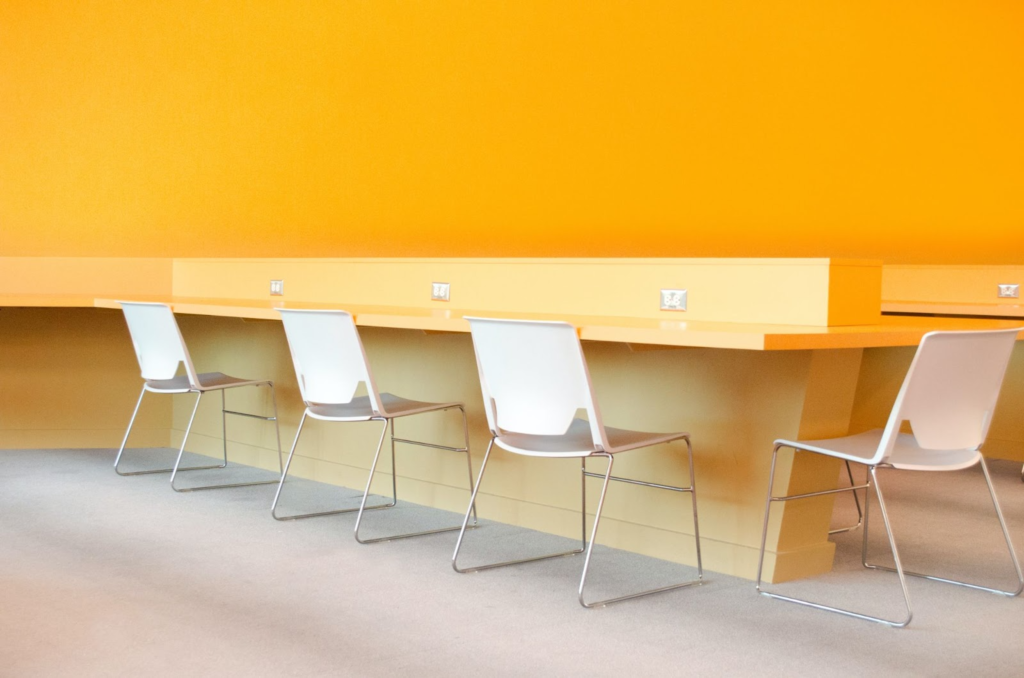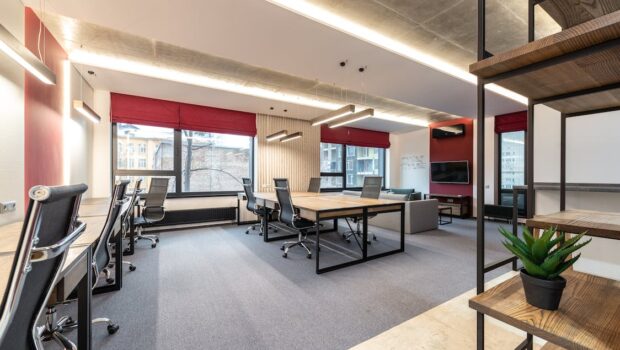9 Design Tips For Your Commercial Business Interior
Commercial interior design is crucial in creating a functional, efficient, and aesthetically pleasing workspace.
Although similar in concept to residential interior design, commercial design differs greatly. Commercial interior design goes beyond creating an appealing look. To achieve a successful outcome, it’s important to adhere to some golden rules. For businesses in Utah, a well-designed interior can significantly impact employee productivity, client satisfaction, and overall success.

Photo by Toa Heftiba on Unsplash
What Is Commercial Interior Design?
Commercial interior design is the art of creating a business environment that is functional, aesthetically pleasing, and attractive to clients or customers.
It can be anything from office space and restaurants to hotels, retail stores, and a doctor’s clinic. Commercial interior design aims to create a space that is both visually appealing and meets the unique needs of a business or organization.
Interior designers consider the client’s needs and the type of business that will be done in the space. Also, they consider how traffic will flow through the space. Commercial interior designers focus not only on aesthetics but also on practical space planning. This includes creating an efficient floor plan and meeting all the necessary code requirements.
What Is The Difference Between Residential And Commercial Design?
The intended use is what makes the difference between residential interior design and commercial interior design.
Commercial interior designers work with clients to create functional and attractive interior spaces in commercial settings—such as an office building or retail shop. On the other hand, residential interior designers focus on creating functional, inviting, and comfortable living spaces for private homes.
Commercial spaces can also be designed for efficiency and productivity, with open floor plans and more work areas. Commercial interiors are often more minimalistic, focusing on efficiency and comfort. Residential interiors tend to be more personalized and have a greater emphasis on comfort.
Both types of interior designers need to have the expertise and a solid understanding of color schemes, space planning, furniture selection, and flooring options. If you want to upgrade your commercial space, here are nine essential tips for commercial interior design in Utah that can help you achieve your goals.
1. Be Smart; Plan Your Space
Before you start making any design decisions, it is important to plan out your space.
Consider the room’s layout, the traffic flow, and how different areas will be used. Ensure you have enough space for everything you need and that each area has a clear purpose.
2. Start With The Basics & Keep It Simple
Before you begin, you must understand the fundamental principles of commercial architecture and interior design. Then, you can create a space that is both functional as well as aesthetically pleasing.
And remember, less is more when it comes to interior design for commercial spaces. Cluttered spaces can be overwhelming and uninviting. Thus, it’s important to keep the design simple and clean.

Photo by Nastuh Abootalebi on Unsplash
3. Use Lighting Effectively
Lighting will become your best friend.
It can have a significant impact on the look and feel of a space. Use a combination of natural and artificial light to create a warm, inviting atmosphere. Consider adding dimmer switches or smart lighting controls to allow for different lighting options depending on the time of day or specific task.
4. Choose Colors Wisely
The colors you choose for your commercial interior design can significantly impact the overall mood and atmosphere of the space.
Consider your brand and the type of business you operate when selecting colors. This is where you need to think about color theory. Do you want a monochromatic theme? Neutral colors can create a professional, sophisticated look, while bold colors can create a more energetic and dynamic environment. Also, consider complementary colors—like blue and orange or green and red.

Photo by Pacific Office Interiors on Unsplash
5. Incorporate Branding Elements
Your commercial interior design should reflect your brand identity and company culture. Incorporate branding elements such as colors, logos, and slogans to create a cohesive look and reinforce your brand image.
6. Focus on Functionality & Your Audience
While aesthetics are important, functionality should always be a top priority.
Your space should be designed to support your business’s and your employee’s needs. Consider factors such as storage, seating, and accessibility to ensure that your space is both functional and comfortable.
It’s essential to consider who will be using the space. This will help you determine the space’s best layout and design elements.
7. Choose Sustainable Materials
Sustainability is an important consideration for any business, and commercial interior design is no exception. Choose eco-friendly and sustainable materials—such as recycled or reclaimed materials—to reduce your environmental impact and create a healthier workspace.
8. Incorporate Technology
Incorporating technology into your commercial interior design can enhance productivity and efficiency. Consider features and accessories such as smart lighting controls, integrated sound systems, and charging stations to create a modern, high-tech workspace.
9. Work With A Professional
Commercial interior design is a complex process. Therefore, it is best to consult a professional to help you.
A professional interior designer will have a vision for the space and be able to coordinate with other professionals who are involved in the construction of commercial spaces, including architects, engineers, and tradespeople.
Furthermore, they are responsible for selecting and specifying furnishings, finishes, lighting, and other materials, developing space plans, preparing construction drawings, and overseeing the installation of projects. The designers can help clients develop budgets, set timelines, and coordinate all design aspects.

Photo by Al ghazali on Unsplash
Final Thoughts
By following these essential tips for your Utah commercial interior business design, you can create a functional and aesthetically pleasing workspace, supporting your business goals and enhancing your team’s overall success. For more informative articles like this, you can check Times of Israel.
Header Photo Credit:- https://www.pexels.com/photo/office-with-tables-and-chairs-near-windows-6899395/





















Very Informative Article And also Very Easy to understand. i hope you will keep posting this type of article. THANK…